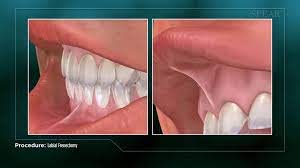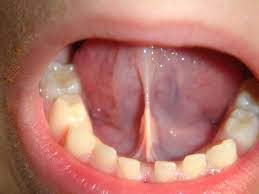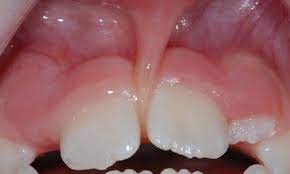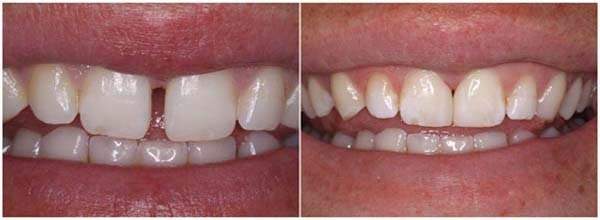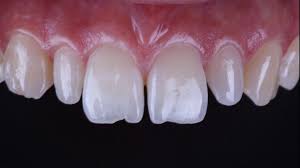Diastema is a space or gap between two teeth. Diastemata are common for children and can exist in adult teeth as well. Diastemata are primarily caused by imbalance in the relationship between the jaw and the size of the teeth. Diastema is sometimes caused or exacerbated by the action of a labial frenulum (the tissue connecting the lip to the gum) causing high mucosal attachment and less attached keratinized tissue. This is more prone to recession or by tongue thrusting, which can push the teeth apart
Diastema Treatment
- Determining the cause of the diastema, then treat the cause.
- Diastema treatment options can differ from one patient to another, but generally it is treated by orthodontics,or composite fillings, or a combination of veneers or crowns.
Frenectomy
A frenectomy, also known as a frenotomy, can refer to any procedure where binding tissue on the body is cut or modified.
Lingual Frenectomy
The lingual frenum connects your tongue to your mouth. If you touch your tongue to the roof of your mouth, you can probably feel the lingual frenum stretching underneath your tongue.
The length of the lingual frenum varies from person to person. In some cases, people are born with a lingual frenum that’s very short. This shortened frenum restricts the movement of the tongue.
This condition is called ankyloglossia, or “tongue tie.” Tongue tie occurs in nearly 5 percent Trusted Source of infants. It’s more common in boys than in girls.
Tongue tie can interfere with breastfeeding during the infant years and speech development as a child grows older.
A quick procedure called a lingual frenectomy can give the tongue a greater range of motion
Maxillary Frenectomy
The labial frenum connects your top lip to the gum area right above your front teeth.
If this frenum is shorter than average, it can cause difficulty in speech development. This condition is a type of lip adhesion.
A lip adhesion can also pose a problem with dental development and make it hard to fully clean the gums and front teeth. This raises the risk of gum disease and other dental complications.
A maxillary frenectomy can give the upper lip more mobility.
Frenectomy Procedure
In most cases, the oral frenectomy procedure is fairly straightforward. Here are the general steps:
- After a consultation with your doctor at Rehan Dental surgery Karachi, the person getting the frenectomy procedure will need to be secured while lying faceup. You may need to hold your child during the procedure.
- Your doctor at Rehan Dental surgery Karachi, may apply a topical anesthetic to the area to numb any pain.
- Your doctor at Rehan Dental surgery Karachi, will quickly snip the frenum using a scalpel, surgical scissors, or a cauterizing instrument.
- If the lip tie is severe or more complicated, it may require a few stitches to close the incision.
- The entire procedure will likely take 15 minutes or less from start to finish.


